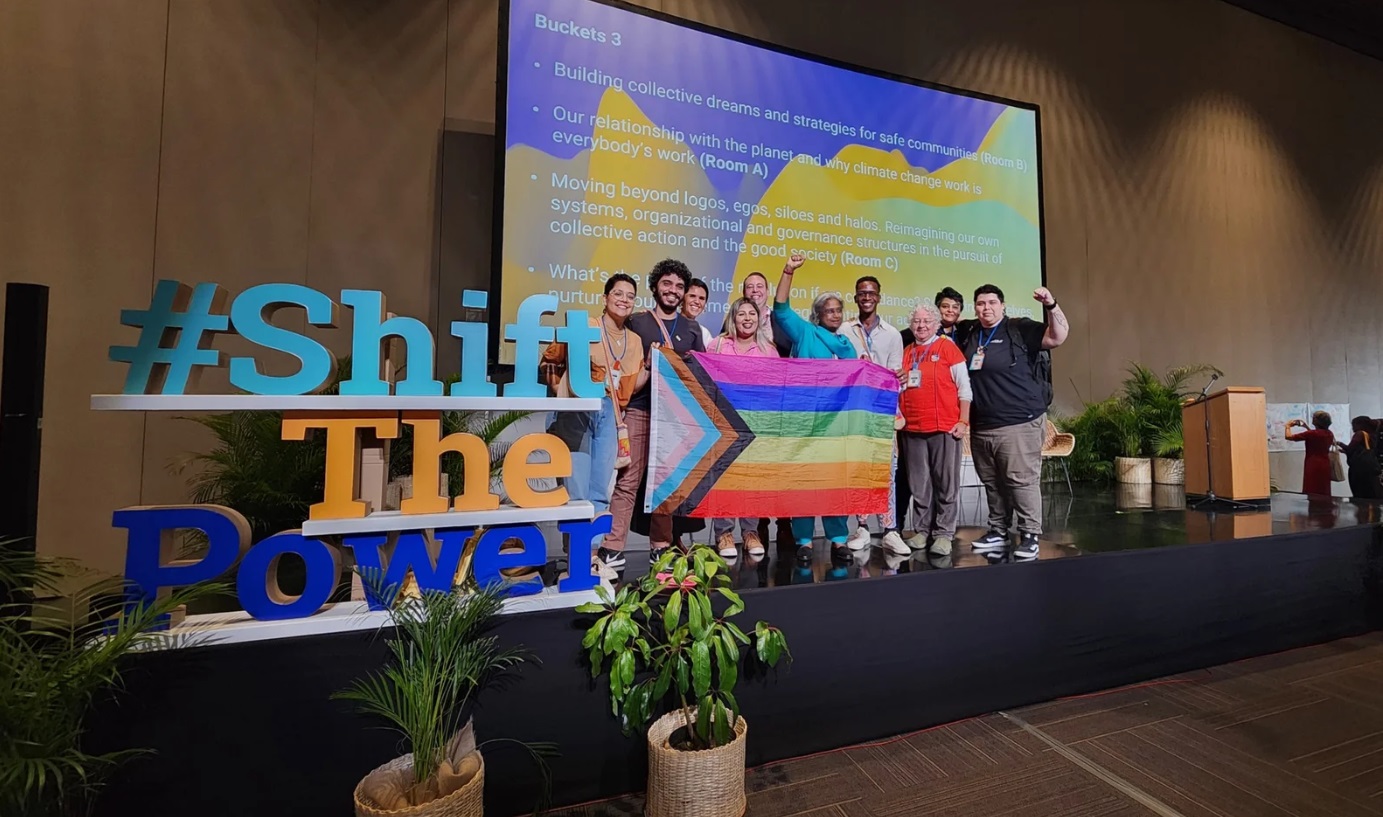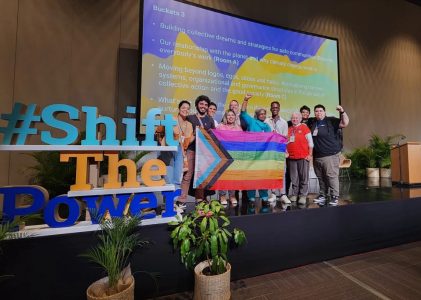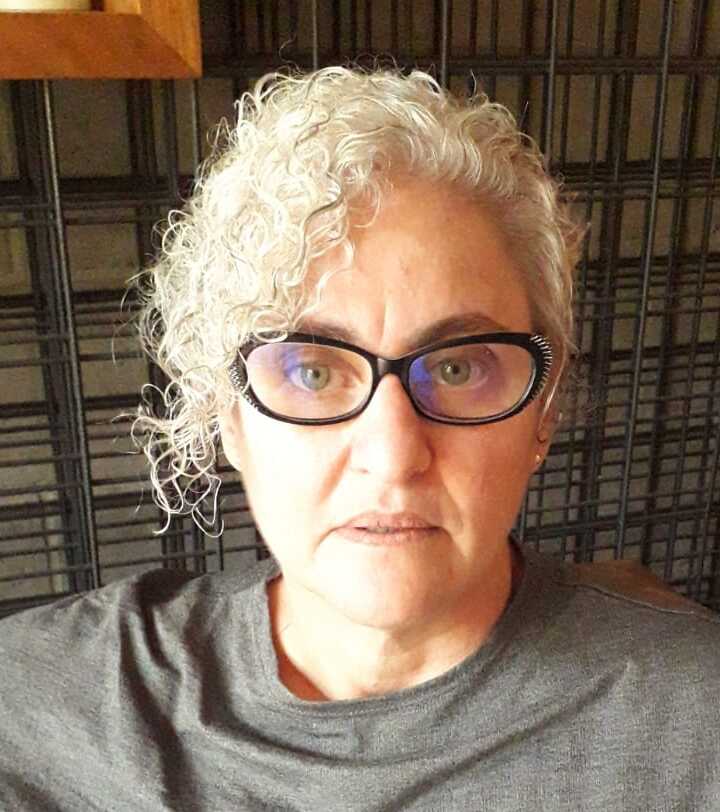
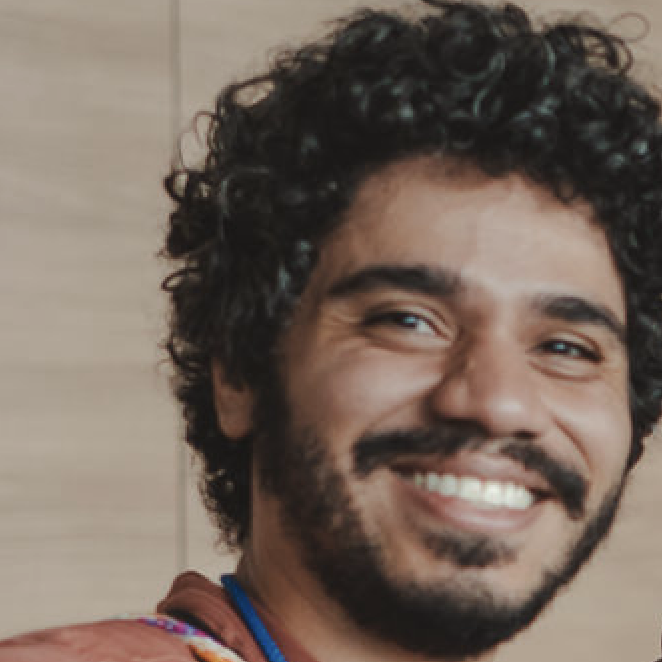
Even by the standards of our increasingly polarised world, Brazil’s 2022 presidential election was particularly toxic. The campaign was marred by disinformation, harassment, and violence.
The result was close. Former president Luiz Inácio Lula da Silva of the Workers’ Party (PT) won the second round of the presidential election in late October, narrowly defeating incumbent Jair Bolsonaro of the Liberal Party (PL). But then, Bolsonaro mounted a court challenge in November, claiming that the country’s voting system was riddled with fraud. The Superior Electoral Court (TSE) chief rejected the case, saying Bolsonaro acted in bad faith.
The country is still recovering from Bolsonaro’s authoritarian rule. In 2023, Civicus Monitor rated Brazil’s civil society as “obstructed”. This means that Giving for Change Alliance partner Comuá Network – a network of 17 philanthropies committed to building a socially just civil society – has a legacy of oppression to overcome. As the 2023 Comuá annual report puts it: “In the first semester of Lula’s government, efforts to acknowledge the rights of political minorities were evident. Economic improvements, including growth and reduced inflation, contributed to an overall sense of optimism for the country’s future… However, threats to the access to rights by marginalized groups persist, as well as their access to resources to continue fighting and protecting their lives and territories.”
We still face the legacy of the Bolsonaro government, with the majority of the National Congress being right wing.
This was the context for the first in-person interview conducted with a Giving for Change partner. The interview took place in the margins of the WINGS Forum in Nairobi, Kenya in October 2023. Ese Emerhi (Global Fund for Community Foundations (GFCF)) and Barry Knight (GFCF advisor) caught up with Graciela Hopstein, Executive Director of Comuá Network, and Jonathas Azevedo, Program Officer, to learn more about their work in building community philanthropy through the Giving for Change programme.
Barry Knight (BK): Let’s start by telling us a little about yourselves, your backgrounds, and how you got into this field of philanthropy, social justice, and community development?
Graciela Hopstein (GH): I have an academic background: my undergraduate and graduate degrees are in Education, and my PhD is in Social Policy. I worked in academia for 14 years until 2014, teaching and doing research activities at different universities in Brazil and Argentina. In 2009, I started working in civil society and my first job was with an independent fund, working as a consultant for the Brazil Foundation – a diaspora fund. I think it was a good start for me, working in independent philanthropy because at the time I didn’t know anything about the philanthropic field. I was later invited to lead the Instituto Rio, a community foundation that funded projects in the West Zone of Rio de Janeiro. Unfortunately, Instituto Rio no longer exists, but I ran that organization for five years (between 2012 and 2016). Our first grant was actually from the Global Fund for Community Foundations. In 2014, I was a Fellow at the CUNY International Fellows Program on Community Philanthropy.
Jonathas Azevedo (JA): In my case, my background is International Relations. When I was at university, I was a bit lost. I didn’t know what to do. International Relations could cover anything. And then I had an elective on international development and humanitarian aid. That’s when I felt like, okay, this is what I want to do. I started working as a fundraiser with Doctors Without Borders. But I felt like I wanted to do a bit more on program management. I applied to work for a civil society organization called Viva Rio, which started as a social movement for peace in Rio de Janeiro. They also worked in health, managing health programs in Rio de Janeiro in partnership with the City Hall and the State government. That’s when I became more aware of some of the power dynamics in the sector as a grantee organization.
Two years after working with Viva Rio, they invited me to go to Haiti. I spent two years there. We were implementing a Community Violence Reduction program alongside grassroots organizations, community leaders, the Haitian National Police and other partners. Haiti was a turning point for me as well, both professionally and personally. It’s one thing to see the challenges of the international development sector through documentaries, articles and all that, and another thing to experience it in person. During that time was the infamous Oxfam scandal as well. It was a really disappointing and frustrating time for me back then. I left Haiti and got a Master’s Degree in the UK (through a scholarship). I studied social innovation and entrepreneurship at LSE. But my experience there was also frustrating; it’s a very complicated institution. We had to fight a lot, try to decolonize a lot of the institution.
I returned to Brazil and decided to work in the field of monitoring and evaluation as a consultant. I wanted to work with civil society organizations actually doing the work on the ground, social movements, and so on. While consulting, I got to know about the Comuá Network. They were one of the clients of the consulting firm I worked for back then. It was through this work that I got introduced to the report, Measuring What Matters. That’s how I fell in love with the work promoted by Comuá’s members.
BK: Tell us about the political context in Brazil. The last time I was there in 2020, things were gloomy. Have things changed?
GH: Yes, completely changed. Well, at the beginning of the year, with a new government, the political environment changed a lot, specifically for people and for sectors that are working with social justice and civil society because they were really under attack during Bolsonaro’s administration. There were a lot of issues related to security and safeguarding. During the Covid-19 pandemic with Bolsonaro, things were even worse.
Although the experience of the COVID-19 pandemic was horrible, it gave us an opportunity to be together as a Network. The pandemic gave us a common problem to overcome.
Our routines have changed a lot. We can breathe a little easier. It’s completely different. And I think that also the economic situation changed a lot. Lula was really the only one who could defeat Bolsonaro. We are glad for a different perspective under his leadership despite living in a democratic system with all its contradictions. We started 2023 with an attack on democracy – the January 8th incident.[1] There is an ongoing investigation and some people behind that incident have been arrested.
JA: Although we are happy to have Lula, we notice that there are a lot of contradictions in his government related to environmental and development policies. His mindset is still stuck on ‘industrialization’. Additionally,we still face the legacy of the Bolsonaro government, with the majority of the National Congress being right wing, which makes things harder for Lula to govern. We’ve recently had an increase in anti-trans legislation at the local, state, and national levels. There have also been two parliamentary inquiry commissions investigating social movements and civil society organizations, like the Landless Rural Workers movement (Movimento dos Trabalhadores Rurais Sem Terra – MST), the biggest social movement in Brazil. Though we’re no longer being directly attacked by the [national] government anymore, there are still some actors trying to undermine the role of civil society.
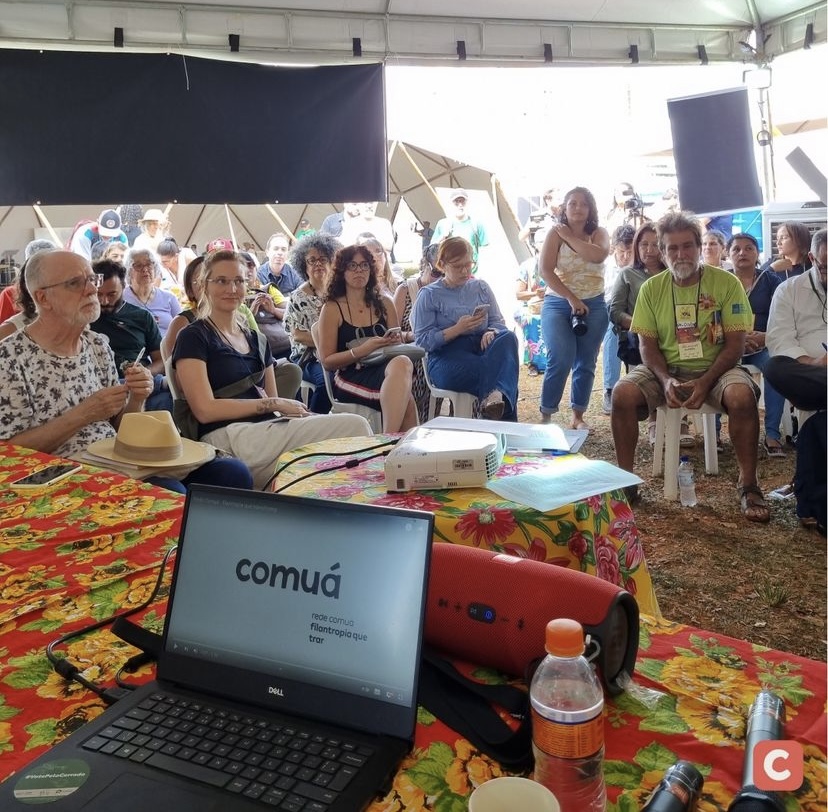
BA: How has all this affected your work as a Network? Has this had a positive effect on the way you can operate?
GH: It has affected our work in a positive way. Before, we were very concerned but now we can just focus on the work. We now have 16[2] members as part of the Network. Although the experience of the COVID-19 pandemic was horrible, it gave us an opportunity to be together as a Network. The pandemic gave us a common problem to overcome.
The Giving for Change programme was a turning point for us as a Network, not just because of the resources, but also because it gave us the opportunity to structure and strengthen our advocacy programme with the entire ecosystem. With our members, we’ve structured our work with them into two components – (i) capacity building and strategic support through grants to help with our members’ advocacy work, and (ii) developing joint advocacy initiatives targeted at the philanthropic ecosystem.
EE: The advocacy work I see Comuá Network doing is quite stellar. What lessons can you share from your advocacy work on the national level?
JA: With our advocacy work, we had to find a common narrative. Because we have 16 members, it means the issues they work on are quite diverse. The Giving for Change programme helped us in defining our common narrative. In our case, it was about strengthening civil society. All of our members – they strengthen civil society, they fund civil society, especially marginalized groups. And by funding those groups, we are strengthening Brazilian democracy. So that’s the common thread.
During our 10th anniversary seminar in 2022, it was the first time members were meeting in-person since the COVID-19 pandemic, and it was a moment to solidify our collective narrative. It was a long process to get us to that point, but we saw how members were all engaged and connected to the common narrative – the clear message was that we are all working to fund civil society. We fund marginalized groups because we believe that is the way to strengthen access to rights. We see democracy as access to rights, not just voting.
We’ve created spaces for collaboration to happen easier, for example, the communities of practice. These are opportunities for members to deeply connect at a personal level, to create new relationships, to build trust with each other, and to start testing and collaborating on new initiatives. The Alliance Among Funds which is made up of three member organizations – Fundo Brasil, Fundo Baoba, and Fundo Casa – is another interesting case study. To date, they have supported 78 quilombola and indigenous organizations, and 55 of them had never received grants or support from any other organization. I think the work around democratizing resources is an asset that we have in the network.
BK: Really interesting job because one of the things that we’ve been finding is that actually marginalized groups just don’t get a voice anymore, except through people who are not actually part of that marginalized group. So people start to talk on behalf of other people. The fact that you’re actually using the voices, authentic voices of marginalized groups is great.
EE: Can you give us other examples of how you’re supporting marginalized groups / communities?
JA: ISPN is another member organization that we work with. They work with indigenous communities in different parts of Brazil. Under the Giving for Change program, we provided a grant to ISPN and they developed a joint program with an indigenous women’s group called Guerreiras da Floresta (Forest Warriors), from the indigenous land called Caru. After an assessment by the indigenous women, they realized that the neighboring communities who were threatening their indigenous lands were also in a very vulnerable situation. They came up with the idea for a micro-grant program (maximum grant given was $1,000) to support those neighboring communities, with the thinking that the grants would help them establish trust and strengthen their relationships with those communities and that, just maybe, they will stop attacking them. It was a success! The indigenous women were fully involved from the beginning of the process – designing the call for proposals, the visits to the communities, etc.
EE: That’s great – very inspiring work. Do you see your advocacy work expanding to other regions in Latin America or internationally, for instance? As the Giving for Change program is in its third year, how can we push a collective advocacy strategy?
GH: I think that maybe we need to stress more on the international connection. It’s important, for example, to connect regionaly in Latin America. I think that this is a really important focus. But in terms of advocacy, maybe in Brazil, it’s really very important that we have a stronger connection with corporate family institutes and foundations, or for example, the Association of Fundraisers (ABCR) or others. We already have connections with many international organizations and forums, like WINGS for instance, where we can share the impact of our work.
BK: This reminds me of the kind of work the Dalit Foundation in India is doing around the “untouchables”. By them connecting to global forums and international organizations like the Foundation for Peace they are able to have a global influence. Do you see this type of model evolving in the Brazilian space?
GH: Yes, for sure. And for example, we have a specific program that we are working on with GIFE where we are trying to influence their associates, showing what community philanthropy is about. And it was a really interesting process because we did a lot of interviews, but also we built an agenda related to community philanthropy. I think that we really need more time, but at least now the agenda of community philanthropy is on the table. We need to go further, we need to strengthen this agenda. For us, it’s like showing that it’s an approach, it’s a concept, it’s a material concept, because it’s not just theory. They realize now that it’s possible to build philanthropy with communities for communities.
BK: What are the other marginalized communities in Brazil? Who are the people that are typically outside the system?
JA: The black population in Brazil. They are 50% of the population, so not a minority in that sense, but in terms of access to rights, they are a political minority. LGBTQI+ population as well, especially the trans community. Other types of traditional communities that live by the river, for instance, in the countryside. The Quilombolas, descendants of enslaved people who resisted against enslavement, is another marginalized group. And women more generally.
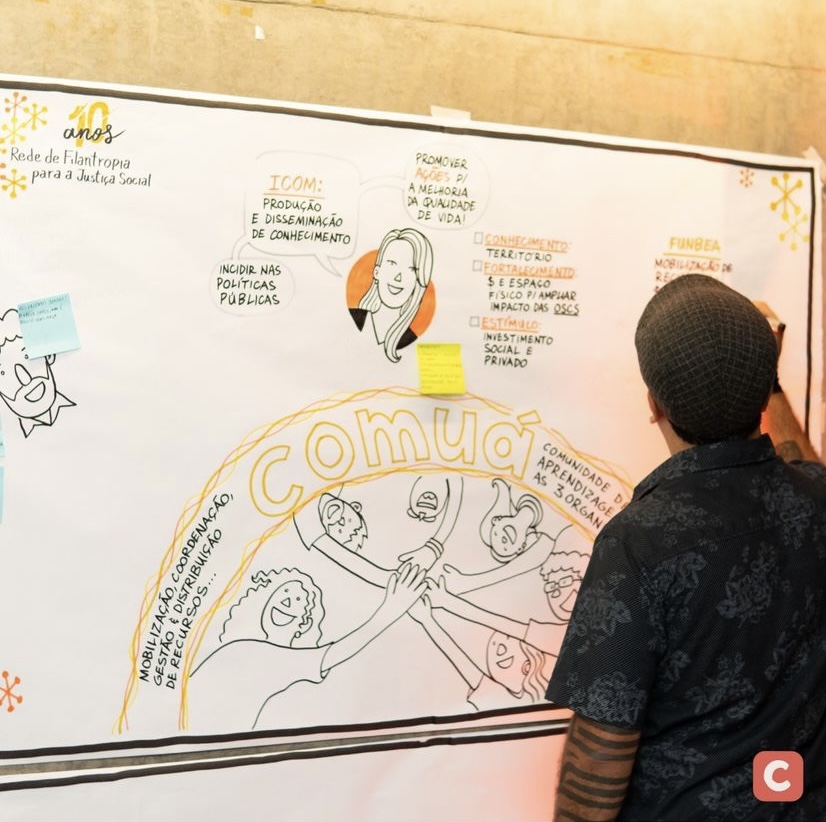
BK: In a sense, we see that politics matters. Brazil used to be one of the most unequal countries in the world. The last two government administrations have pushed Brazil even further backwards. The story I’m hearing from the Giving for Change Alliance partners is that yes, the programme has given you extra resources. But more than that, it’s given you space to enable you to do more of what you are doing, only now doing it much more intentionally and better. For you, your focus has been on advocacy and in particular, paying attention to marginalized groups. So you are really kind of changing the social structure in terms of your work, given a clearer shape to the work you do. Is that a fair summary of what the programme has enabled you to do?
GH: Yes, and another component is that our advocacy work has helped us with the production of knowledge and communication materials. Production of knowledge is important to show our work, build our agenda, and show how funders can support many of these initiatives like community philanthropy. We’ve done extensive research and are in fact just finalizing a mapping of independent funds in Brazil. This mapping exercise helped us identify 17 community independent funds, all related to social movements in one way or the other. In Brazil, we have a very traditional and conservative philosophical approach to philanthropy and they do not typically support local initiatives, so our research work helps to highlight alternative approaches.
We fund marginalized groups because we believe that is the way to strengthen access to rights. We see democracy as access to rights, not just voting.
JA: The Saberes Fellowship is another part of our advocacy work. In the case of the Fellowship, we selected seven community leaders, people working in community philanthropy, social movements and so on. They are the ones producing knowledge in different formats because we believe that it’s not only the academic formats of knowledge that matter. For example, one of the Fellows, Ronaldo de Yemojá, lives in the South of Bahia. He is a leader of an Afro-Brazilian religion called Jurema, which is another marginalized group, people from Afro-Brazilian religions. In his case, he is using oral tradition of storytelling (podcasts) because that’s the ancestral way of sharing knowledge in Black communities in Brazil. Though they are doing community philanthropy they don’t call it that.
EE: You are about to have a second cohort of the Saberes Fellowship, correct? One thing I find interesting is that within the Giving for Change programme, there are three different approaches of working with change makers – from the GFCF’s #ShiftThePower Fellows to Micaia’s Community Champions and now to Comuá Network’s Saberes Fellows. It would be good to explore together what these three separate initiatives have done so we can compare our learnings and workings: how is change happening with these leaders?, how does this connect to shifting perceptions on leadership and knowledge production?
JA: Yes the call for the second cohort is happening this month and we hope to have around the same number of Fellows for the second cohort, below ten Fellows. [At the publication of this interview, the second cohort of the Saberes Fellowship had already been announced.)
BK: Graciela, you’ve mentioned communication as an integral part of your work. And you have a great story to tell. Are you telling that story? In Europe, for instance, philanthropy is still very traditional, still very linear in terms of thinking. But what you’re building with Comuá Network is a very different way of being and doing and thinking, using networks to reach across whole ecosystems within Brazil. That’s a very powerful way of operating.
GH: We could be doing more in telling our story. We have a lot of data because every year we conduct a survey with our members. It’s a long survey but we are also mapping relationships with international partnerships and networks.
BK: Where do you want to go with the two years left with the Giving for Change programme?
GH: We have two alliances within the Network. One of the alliances is between three funds; it’s interesting work because beyond the mobilization of resources, they are also exchanging experiences and creating new initiatives. The second alliance – Territorial Alliance – is between seven members. Together as an alliance, they are finding it easier to mobilize resources, because locally we don’t have a tradition of giving, so working together they are able to attract resources from international organizations. They also do a lot of research, for example, they show in which territories they are working in, how many grants they give, which thematic area the grants are in, etc. I think this second alliance will have the potential for new partnerships in the Network and beyond.
JA: This Territorial Alliance is also showing that there’s another way of collaborating that is more impactful and that has the effect of strengthening civil society that supports social justice and marginalized groups.
EE: Are you hopeful about the next two years?
GH: Completely, yes. I think that the Network is going to grow. In fact, the mapping research exercise gave us a very good perspective. I think that we are going to have like four or five new members because of it. So I think that we are going to grow in terms of members, in terms of resources, and this is really very important. The Giving for Change programme has given us the possibility to have new funders because we’ve gained a lot of visibility and because of this work, we’re prospecting to get at least two or three new funders. And for us the money that comes from national foundations (or private social investors) in Brazil is really very little. But politically, it’s more important to have them as partners.
BK: What would help you move to the next stage? The organic development you talked about? What would help make that shift?
GH: The Network was not formalized when we first started. Now, Comuá Network is a registered organization in Brazil. The formalization of the Network was a significant development that influenced the trajectory of the organization under the Giving for Change programme, as it supports the overall sustainability of the Network’s advocacy efforts. I think the next challenge for us now is how to create a process in terms of strengthening our Network as an institution. We don’t want to institutionalize the Network, but we need to create processes for the Network that enables change to happen, things like management systems and bank accounts, governance, etc.
I think another thing is for us to strengthen our connections more broadly with our African partners and institutions. We are already doing that through the Giving for Change programme, but that African connection is very important to us.
BK: Yes, a true South-South connection is key. Thank you for a lovely conversation!
Graciela Hopstein is the Executive Director of Comuá Network. Jonathas Azevedo is the Program Officer at the Comuá Network, and this article has also been translated to Portuguese.
